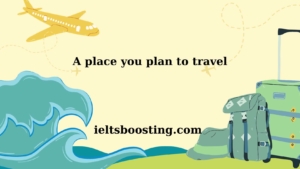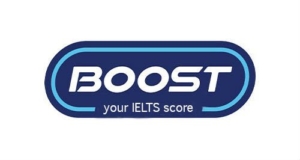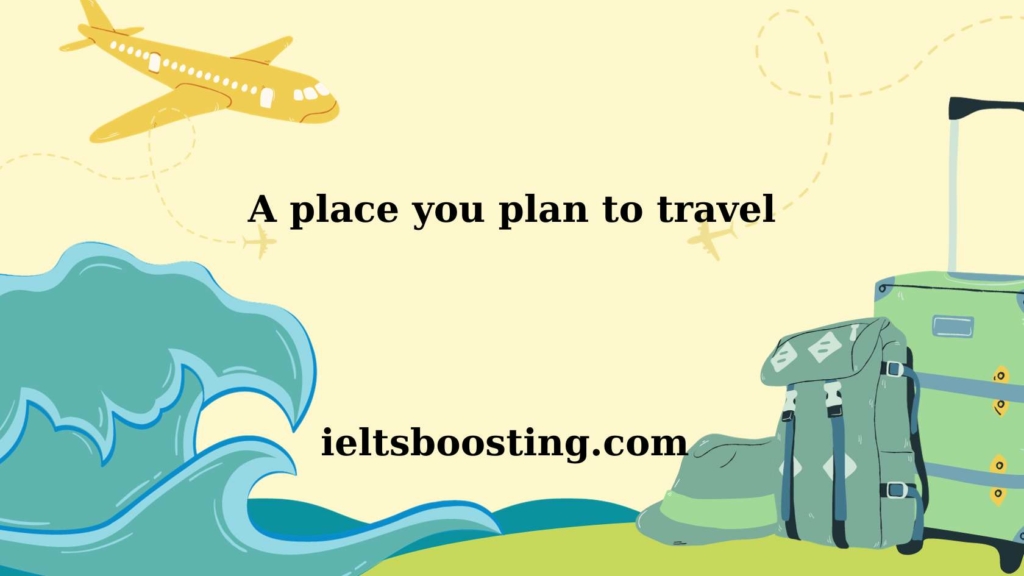Describe a place you plan to travel to that is far away from your home in the future
You should say for a place you plan to travel to that is far away from your home in the future
Where it would be
When you would like to go
How you would like to go there
What you would do there
Who you would go with
And explain why you would like to visit the place

a place you plan to travel to that is far away from your home in the future
Sample Answer for a place you plan to travel to that is far away from your home in the future
For my future travels, I have set my sights on Nha Trang, a picturesque coastal city in Vietnam, which I plan to visit during the Tet holiday. This is a time of great cultural significance in Vietnam, marking the lunar New Year, and is characterized by festivities and a spirit of renewal. To reach Nha Trang, I would embark on a road trip with my family, traversing the countryside and enjoying the evolving vistas from the comfort of our car.
Our activities in Nha Trang would be diverse and engaging. We would bask on the sun-kissed beaches, swim in the crystal-clear waters, and perhaps partake in water sports. Visiting the local markets and trying traditional Vietnamese dishes would be essential to our experience. We’d also allocate time to explore historical sites, such as the ancient temples and the iconic Nha Trang Cathedral, immersing ourselves in the rich tapestry of the city’s history and culture.
I would be accompanied by my family, as shared experiences are the essence of our collective memory-making. Together, we would navigate through the city’s vibrant energy, especially during Tet when the city is alive with decorations and the air is filled with the promise of good fortune.
The reason for choosing Nha Trang, particularly during Tet, is to engage deeply with a tradition that is at the heart of Vietnamese culture. Witnessing the city adorned in its festive regalia, participating in local customs, and feeling the warmth of the community are experiences that resonate with my quest for cultural enrichment. Furthermore, the journey promises to strengthen family ties, offering a retreat from our usual routines into a space where we can enjoy each other’s company against the backdrop of Nha Trang’s natural and cultural beauty.
Explore more: ielts speaking part 2
High-level vocabulary for a place you plan to travel to that is far away from your home in the future
- Picturesque (adj.) -đẹp như tranh vẽ- visually attractive, especially in a quaint or charming way.
- Cultural significance (n.) – ý nghĩa văn hóa- the importance of a place, thing, or event as it relates to the culture and values of a particular group.
- Festivities (n.) – lễ hội – celebrations or observances of a festive occasion.
- Spirit of renewal (n.) – tinh thần mới – a feeling or ethos of starting afresh or being rejuvenated.
- Embark (v.) – khởi hành – to start or begin a journey or course of action.
- Diverse (adj.) – đa dạng – showing a great deal of variety; very different.
- Engaging (adj.) – lôi cuốn – charming and attractive; tending to draw favorable attention.
- Immerse (v.) – đắm chìm – to become completely involved in an activity or interest.
- Tapestry (n.) – tấm thảm – something that is complex or detailed in design.
- Iconic (adj.) – biểu tượng – widely recognized and well-established; acting as a sign or symbol of something.
- Collective memory-making (n.) – sự tạo ra ký ức chung – the process of creating shared memories among a group of people.
- Vibrant energy (n.) – năng lượng tràn đầy – lively and dynamic force or atmosphere.
- Regalia (n.) – trang phục truyền thống – the emblems or insignia of royalty or of an order or society, often used to denote celebration or festivity.
- Cultural enrichment (n.) – làm giàu văn hóa- the process of gaining a deeper understanding and appreciation of different cultures.
- Retreat (n.) – nơi nghỉ ngơi – a place of refuge or rest; a place one can go to be away from the usual environment.

a place you plan to travel to that is far away from your home in the future
Part 3 – a place you plan to travel to that is far away from your home in the future
Where do people usually travel on holidays?
People usually travel to a wide range of destinations during holidays, and their choice of location can depend on their interests and preferences. Some opt for popular tourist spots such as tropical beaches like Bali, where they can enjoy sun, sea, and relaxation. Many seek the thrill of metropolitan cities, like New York or Paris, where they can indulge in shopping, dining, and entertainment. Nature enthusiasts often escape to the countryside or mountains, for example, the Swiss Alps, to enjoy hiking and tranquility. Lastly, some prefer visiting family or exploring heritage sites within their own country, aiming for comfort or educational experiences.
- Leisure (n.) – thời gian rảnh rỗi – time free from work or duties.
- Exploration (n.) – sự khám phá – the action of traveling in or through an unfamiliar area in order to learn about it.
- Tropical (adj.) – nhiệt đới – relating to the tropics, the warmest region of the Earth.
- Renowned (adj.) – nổi tiếng – known or talked about by many people; famous.
- Metropolitan (adj.) – thuộc về đô thị lớn- related to a large city, its surrounding areas, and its distinctive urban culture.
- Indulge (v.) – nuông chiều – to allow oneself to enjoy the pleasure of something. engage
- Nature enthusiasts (n.) – người yêu thiên nhiên – individuals who have a strong interest in and passion for the natural world and outdoor activities.
- Tranquility (n.) – sự yên bình – the quality or state of being tranquil; calm.
- Heritage sites (n.) – di sản- places that have been officially recognized for their cultural, historical, scientific, or other forms of significance.
- Educational experiences (n.) – trải nghiệm giáo dục- activities or visits that provide knowledge and learning opportunities.
Why do some people think it is enjoyable to stay at home on holidays?
Some individuals find staying at home during holidays enjoyable because it offers a respite from the fast pace of everyday life, allowing them to relax and rejuvenate in a familiar environment. The comfort of home provides a stress-free zone where one can indulge in hobbies or spend quality time with family without the hassle of travel. For example, a person might enjoy the holiday by starting a new book or engaging in a movie marathon, activities that require little preparation but are greatly satisfying. Additionally, staying at home can be a cost-effective way to enjoy the holiday, avoiding the expenses associated with vacationing.
- Respite – Sự nghỉ ngơi – A short period of rest or relief from something difficult or unpleasant.
- Rejuvenate – Làm trẻ lại – To make someone or something look or feel younger, fresher, or more lively.
- Indulge – Nuông chiều – Allow oneself to enjoy the pleasure of.
- Hassle – Phiền hà – Irritating inconvenience.
- Marathon – Cuộc đua marathon – An event or activity that requires prolonged effort or endurance.
- Satisfying – Thoả mãn – Giving fulfillment or the pleasure associated with this.
- Cost-effective – Hiệu quả về chi phí – Economical in terms of the goods or services received for the money spent.
How do students who have taken a gap year differ from other students?
Students who have taken a gap year often bring a broader perspective to their studies due to their additional life experiences. They may have developed a higher level of independence and self-reliance from navigating unfamiliar environments or situations during their time off. For example, a student who spent a gap year volunteering abroad might have enhanced cultural sensitivity and better problem-solving skills. These students can also exhibit greater maturity and a clearer sense of direction in their educational goals, having had more time to reflect on their interests and aspirations.
- Broader perspective – Quan điểm rộng hơn – A wider or more comprehensive view or outlook on something.
- Independence – Độc lập – The state of being self-sufficient and not reliant on external support.
- Self-reliance – Tự lực – Reliance on one’s own powers and resources rather than those of others.
- Navigating – Điều hướng – Directing the course of oneself or something else through a complex system or environment.
- Cultural sensitivity – Nhạy cảm văn hóa – The awareness and respect of other cultures’ norms and practices.
- Problem-solving skills – Kỹ năng giải quyết vấn đề – The ability to find solutions to difficult or complex issues.
- Maturity – Sự chín chắn – The state of being fully developed in the body or the mind.
- Clearer sense of direction – Nhận thức rõ ràng về hướng đi – A strong understanding of one’s goals and the path to achieve them.
Do teenagers usually travel with friends or alone?
Teenagers typically prefer to travel with friends as it provides a sense of camaraderie/companionship and shared experience that enhances the joy of discovery. Traveling in groups can also offer a feeling of security and support, which is particularly appealing to younger individuals stepping out into the world. For instance, a group of teenagers might embark on a road trip together, enjoying the collective adventure and the memories they create along the way. While solo travel does appeal to some teenagers who seek independence and self-exploration, it is generally less common than traveling with peers.
- Camaraderie – Tình bạn – A feeling of friendliness towards people that you work or share an experience with.
- Shared experience – Trải nghiệm chung – An event or activity that two or more people participate in and can relate to together.
- Discovery – Khám phá – The action or process of discovering or being discovered.
- Security – An ninh – The state of being free from danger or threat.
- Support – Sự hỗ trợ – Assistance given to someone, especially in a difficult situation.
- Embark on – Bắt đầu – To start a new project or activity, usually one that will be difficult and will take time.
- Adventure – Cuộc phiêu lưu – An unusual, exciting, and possibly dangerous activity, such as a trip or experience, or the excitement produced by such activities.
- Independence – Độc lập – The state or quality of being independent; freedom from dependence; exemption from reliance on, or control by, others; self-subsistence or maintenance; direction of one’s own affairs without interference.
- Self-exploration – Tự khám phá – The examination and analysis of one’s own unrealized spiritual or intellectual capacities.
What do you think is the most desirable place for people to visit during the holiday?
The most desirable place for a holiday visit can vary greatly depending on individual preferences, but tropical beaches are often a popular choice due to their association with relaxation and beauty. These destinations offer a perfect blend of natural scenery, leisure activities, and the opportunity for both adventure and relaxation. For instance, the Maldives is a sought-after location where visitors can enjoy crystal-clear waters, white sandy beaches, and luxurious overwater bungalows. Moreover, such environments are conducive to disconnecting from everyday stresses, allowing travelers to unwind and recharge in a serene setting.
- Desirable – mong muốn – Wished for as being an attractive, useful, or necessary course of action.
- Tropical beaches – Bãi biển nhiệt đới – Coastal areas located in the tropical zone, typically characterized by warm climates and natural beauty.
- Leisure activities – Hoạt động giải trí – Enjoyable acts or pursuits that are freely chosen for relaxation.
- Sought-after – Được săn đón – Greatly desired or envied.
- Crystal-clear waters – Nước trong như pha lê – Water that is absolutely transparent and unclouded.
- Serene setting – Bối cảnh yên bình – An environment that is calm and peaceful.
- Unwind – Thư giãn – To relax and reduce your level of stress.
- Recharge – Nạp lại năng lượng – To regain energy or spirit.
What does tourism have to do with cultural exchange?
Tourism is intrinsically linked to cultural exchange as it involves people visiting new places and experiencing the customs, traditions, and way of life of the local inhabitants. This interaction allows tourists to gain insights into a culture that is different from their own, fostering a greater understanding and appreciation for diversity. For example, when travelers participate in local festivals or try traditional cuisines, they engage directly with the cultural fabric of the destination. Consequently, tourism can be a powerful vehicle for promoting international camaraderie and broadening one’s cultural horizons.
- Intrinsically – Về bản chất – In an essential or natural way.
- Customs – Phong tục – The official department that administers and collects the duties levied by a government on imported goods. Also refers to the traditional and widely accepted way of behaving or doing something that is specific to a particular society, place, or time.
- Traditions – Truyền thống – Long-established customs or beliefs that are passed down from generation to generation.
- Insights – Sự hiểu biết sâu sắc – An accurate and deep understanding of a person or thing.
- Diversity – Đa dạng – The state of being diverse; variety.
- Festivals – Lễ hội – A day or period of celebration, typically for religious reasons.
- Cuisine – Ẩm thực – A style or method of cooking, especially as characteristic of a particular country, region, or establishment.
- Camaraderie – Tình bạn – Mutual trust and friendship among people who spend a lot of time together.
- Cultural horizons – Chân trời văn hóa – The limit of one’s knowledge, experience, or interest in different cultures.


